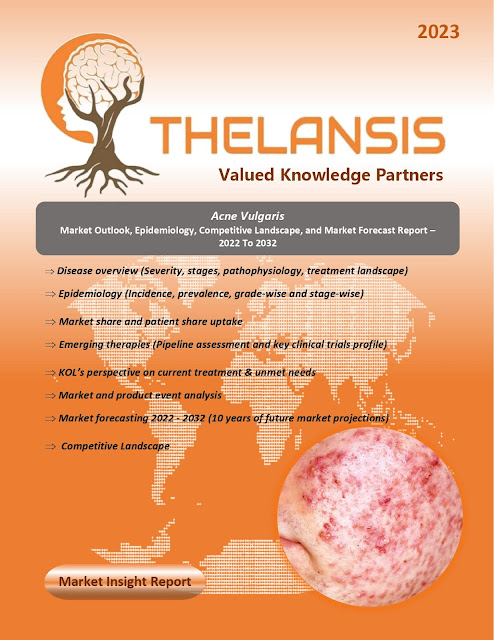Lamellar Ichthyosis – Market Outlook, Epidemiology, Competitive Landscape, and Market Forecast Report – 2021 To 2032
Lamellar ichthyosis (LI) is a
genetically heterogeneous keratinization disorder inherited in an autosomal
recessive manner. It is classified as a subtype of autosomal recessive
congenital ichthyosis (ARCI), a spectrum of nonsyndromic ichthyoses caused by
genetic mutations in various genes. The disease course of LI varies from mild
to severe, with severe cases involving complications such as ectropion,
eclabium, scarring alopecia of the scalp and eyebrows, and palmar and plantar
hyperkeratosis. The presenting feature of LI in neonates is a collodion
membrane, which eventually dries and peels away, leaving behind a brown,
plate-like scale that covers the entire body. The underlying genetic mutations
that cause LI have been identified in various genes, including TGM1, ALOX12B,
ABCA12, and NIPAL4. Most mutations are found in the TGM1 gene, which encodes
transglutaminase 1, a protein forming the epidermal cornified cell envelope.
Patients with LI have an average life expectancy. However, skin scaling can
lead to complications such as obstruction of sweat glands, resulting in
thermoregulatory difficulties, and bacterial colonization in areas of excessive
scaling may lead to chronic ear infections. Other complications include nail
dystrophy, ectropion formation, and scarring alopecia. The differential
diagnosis of LI includes other forms of ichthyosis, recessive X-linked
ichthyosis, semi-dominant ichthyosis Vulgaris, and erythroderma. The course of
the disease is variable and may remain stable throughout life, with periods of
exacerbation. However, LI can significantly impact the quality of life due to
the altered physical appearance, symptoms, and limitations imposed by the
disease and its treatment.
·
Lamellar ichthyosis (LI) is a rare inherited
skin disorder of cornification, with an incidence of approximately 1 to 2 cases
per 200,000 births in the USA.
Thelansis’s “Lamellar Ichthyosis
Market Outlook, Epidemiology, Competitive
Landscape, and Market Forecast Report – 2021 To 2032" covers disease
overview, epidemiology, drug utilization, prescription share analysis,
competitive landscape, clinical practice, regulatory landscape, patient share,
market uptake, market forecast, and key market insights under the potential Lamellar
Ichthyosis treatment modalities options for eight major markets (USA, Germany,
France, Italy, Spain, UK, Japan, and China).
KOLs insights
of Lamellar Ichthyosis across 8 MM market from the centre of Excellence/
Public/ Private hospitals participated in the study. Insights around current
treatment landscape, epidemiology, clinical characteristics, future treatment
paradigm, and Unmet needs.
Lamellar Ichthyosis Market Forecast Patient
Based Forecast Model (MS. Excel Based Automated Dashboard), which Data Inputs
with sourcing, Market Event, and Product Event, Country specific Forecast
Model, Market uptake and patient share uptake, Attribute Analysis, Analog
Analysis, Disease burden, and pricing scenario, Summary, and Insights.
Thelansis Competitive Intelligence (CI) practice
has been established based on a deep understanding of the pharma/biotech
business environment to provide an optimized support system to all levels of
the decision-making process. It enables business leaders in forward-thinking
and proactive decision-making. Thelansis supports scientific and commercial
teams in seamless CI support by creating an AI/ ML-based technology-driven
platform that manages the data flow from primary and secondary sources.




Comments
Post a Comment